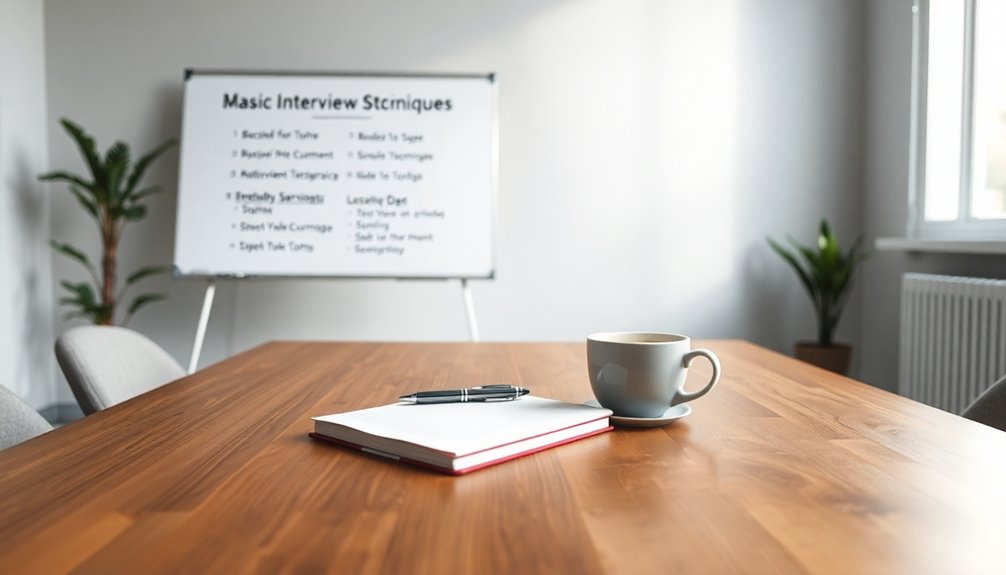To master the art of interview structuring, start by using a standardized format for fairness and efficiency. Pre-plan your questions to focus on relevant skills and experiences, aligning them with the job description. Create a grading scale to evaluate responses consistently and guarantee a distraction-free environment for candidates. Ask targeted, open-ended questions to gain insights into how candidates handle challenges. By fostering a professional atmosphere, you'll ease nerves and encourage clearer communication. This structured approach boosts your hiring accuracy and helps you make quick, informed decisions. If you're curious about more advanced techniques, there's plenty more to explore.
Key Takeaways
- Establish a standardized format to ensure fairness and consistency across all interviews.
- Develop targeted questions that align with essential skills and competencies required for the role.
- Create a clear grading scale to evaluate candidate responses consistently and objectively.
- Utilize behavioral-focused questions to gain insights into candidates' past experiences and decision-making processes.
- Choose a distraction-free environment to promote a professional atmosphere and help candidates perform at their best.
Understanding Interview Structure

When you immerse yourself in understanding interview structure, you'll find it's all about creating a standardized format that guarantees fairness and efficiency.
This approach involves asking every candidate the same set of pre-planned questions, focusing on skills and experiences relevant to the job. By limiting follow-up questions, you maintain time efficiency while ensuring a consistent evaluation framework.
You'll want to establish clear evaluation criteria and prepare structured questions in advance. Utilize candidates' resumes to highlight their qualifications effectively.
A distraction-free environment is essential for interviews, allowing candidates to concentrate fully.
Ultimately, this method creates a reliable reference point for comparing candidates, helping you make informed hiring decisions based on objective assessments. Additionally, incorporating testing methodologies into your evaluation can help gauge candidates' understanding of essential SQA practices.
Benefits of Structured Interviews

Structured interviews offer numerous advantages, as they not only promote fairness but also enhance the overall hiring process.
By asking all candidates the same pre-planned questions, you guarantee that everyone has an equal opportunity to showcase their skills. This consistency allows for more accurate comparisons between candidates, making it easier to identify the best fit for the role.
You'll also benefit from quicker decision-making, as structured interviews streamline evaluations and reduce biases.
Additionally, preparing targeted questions in advance helps you stay focused on relevant topics, leading to more productive conversations.
Ultimately, using a structured approach cultivates a professional atmosphere that can ease candidate nerves and foster genuine engagement throughout the interview process.
Preparing for the Interview

Preparing for an interview involves several critical steps that can greatly impact its success.
First, review the job description to identify essential skills and qualifications. This helps you align your questions with the job's requirements.
Next, develop a structured set of questions focused on the key competencies you want to assess, ensuring they're clear and relevant. Create a grading scale to evaluate responses consistently.
Additionally, gather each candidate's resume to highlight their qualifications and tailor your questions accordingly.
Finally, choose a distraction-free environment for the interview. This sets the stage for a professional atmosphere, allowing candidates to focus and perform their best.
Crafting Effective Interview Questions

Crafting effective interview questions is a vital step in ensuring that you accurately assess candidates' skills and fit for the role.
Focus on creating questions that elicit specific responses, allowing you to gauge their capabilities clearly.
Consider these key elements:
- Targeted questions: Align your questions with the job's essential skills and responsibilities.
- Behavioral focus: Use situational and behavioral questions to understand how candidates have handled challenges in the past.
- Open-ended prompts: Encourage candidates to elaborate on their experiences, giving you deeper insights into their thought processes.
Incorporating behavioral focus in your interviews can help reveal how candidates respond under pressure and adapt to challenges.
Techniques for Engaging Candidates

While engaging candidates during an interview, it's crucial to create an inviting atmosphere that encourages open communication. Start with a friendly introduction to put them at ease.
Use open-ended questions that allow candidates to express themselves freely, fostering a more natural dialogue. Incorporate small comments or praise as they respond to enhance the conversation flow.
Make eye contact and nod to show you're actively listening; this builds rapport and trust. Balance structured questions with conversational elements to keep the atmosphere relaxed yet focused.
Allow candidates to share anecdotes or insights about their experiences, which can lead to valuable discussions.
Evaluating Candidate Responses

Creating an inviting atmosphere allows candidates to express themselves openly, but evaluating their responses effectively is just as important.
You'll want to focus on key aspects that reveal their suitability for the role. Here are three things to reflect on:
- Substance: Look for specific examples that showcase their skills and experiences.
- Clarity: Confirm their answers are articulated well and demonstrate understanding.
- Relevance: Check if their responses align with the job requirements and company culture.
Additionally, consider how their answers reflect ethical decision-making, as this can enhance brand reputation and trust in your organization.
Maintaining Consistency in Interviews

Consistency in interviews is essential for guaranteeing fair evaluations across all candidates. By standardizing your approach, you can effectively compare each candidate's skills and qualifications. Here's a quick look at key practices to maintain consistency:
| Practice | Purpose |
|---|---|
| Use a structured question set | Guarantees everyone answers the same questions |
| Standardize scoring methods | Promotes objective evaluations |
| Train interviewers | Aligns understanding of evaluation criteria |
| Take detailed notes | Captures insights for accurate comparisons |
| Review grading scales | Maintains uniformity among interviewers |
Additionally, consistent evaluation practices can help prevent trust issues that may arise from subjective interpretations of candidate responses.
Frequently Asked Questions
How Can I Improve My Interviewing Skills Over Time?
To improve your interviewing skills over time, start by seeking feedback after each interview.
Analyze your questions and the responses you receive. Practice active listening to better engage with candidates.
Keep up with best practices by reading articles or attending workshops. Record your interviews to identify areas for improvement.
Finally, consistently evaluate your performance and adapt your techniques based on what works best for you and the candidates you interview.
What Should I Do if a Candidate Becomes Unresponsive?
If a candidate becomes unresponsive, it can feel like you're trying to crack a safe without the combination!
Start by gently re-engaging them with open-ended questions or asking for their thoughts on previous topics. Use a light-hearted comment to ease the tension.
If they still struggle, offer a moment of silence to gather their thoughts. Always maintain a supportive tone, as this can help them feel more comfortable and willing to engage.
How Do I Handle Nervous Candidates During Interviews?
When you face nervous candidates during interviews, start by creating a relaxed atmosphere. Use a warm greeting and engage in light conversation to ease their anxiety.
Allow for pauses, showing patience as they gather their thoughts. Incorporate open-ended questions that encourage dialogue, and provide positive feedback to build their confidence.
Finally, maintain eye contact and actively listen, demonstrating that you value their responses and want them to succeed in the conversation.
Can I Include Industry-Specific Questions in Structured Interviews?
Absolutely, you can weave industry-specific questions into your structured interviews like intricate threads in a tapestry.
These questions not only highlight a candidate's relevant knowledge but also demonstrate your understanding of the field.
Just make certain they align with your core evaluation criteria.
Balancing these tailored queries with standardized ones keeps the interview consistent while allowing you to gauge how well candidates fit into the industry's unique landscape.
What Resources Are Available for Interview Training?
When you're looking for resources for interview training, consider online courses, workshops, or webinars focused on interviewing techniques.
Books on effective interviewing can provide valuable insights too.
Many organizations offer training programs that include role-playing and feedback.
You can also explore industry-specific resources to tailor your skills further.
Don't forget to engage with professional networks or forums for shared experiences and tips from others who've honed their interview skills.
Conclusion
By mastering interview structuring, you're not just filling positions; you're building a team that thrives. Picture yourself as a skilled architect, designing a strong foundation for future success. With a consistent approach, engaging questions, and fair evaluations, you can transform the hiring process into a streamlined journey. So, roll up your sleeves and plunge into it—your next great hire is just an interview away! Your efforts today will shape the team's success tomorrow.









